You may have heard about metal detectors and found yourself wondering – What is the best metal detector for beginners? In this article, we will answer that question by reviewing a few of our favorite beginner-friendly detectors. We will also give you some tips on how to choose the best one for your needs.
A metal detector is a device that can detect the presence of metals. It works by emitting an electromagnetic field, which it uses to determine if there are any nearby objects with magnetic properties. Most detectors output an audio signal when they find something metallic, and many will vibrate or beep at you to let you know about an object’s presence without having to listen for the tone each time. Some people use these devices because they’re interested in historical artifacts like treasure chests or old coins; others just want more peace of mind while they’re out gardening! Metal detecting has become very popular over recent years – millions of individuals own one now, so chances are good that someone near you also owns one too!
There are a number of questions that often come up when people decide to buy a metal detector. One is: what is the best metal detector for beginners? This question does not have one single answer, but we can provide you with some good options based on your budget and general needs.
In order to get the most out of these detectors though it’s helpful if you know how they work – this way, you’ll be able to maximize their potential! It takes some practice before you start finding things regularly (especially gold!) so don’t give up after just an hour or two in the backyard! We also recommend reading our article about beginner-friendly features . If there’s anything else specific that concerns you feel free to ask us ! Now let’s take a look at our top two beginner metal detectors.
Best Beginner Metal Detectors Reviews
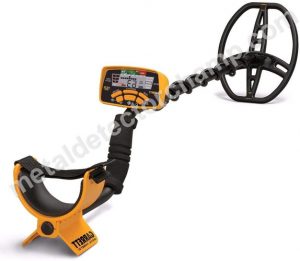
The Garrett Ace is a good choice for beginners because it comes with an easy to use design and operation. The price of this metal detector is on the higher end, but it’s worth every penny. This model features an all-metal mode which means you won’t miss any valuable finds with its impressive depth capabilities. It also comes with a preset discrimination control that can be adjusted for different circumstances or sites where there are larger concentrations of junk metals around like iron and zinc deposits in some soils.
It has additional options such as mineralized ground tracking and sensitivity adjustments to help eliminate interference from unwanted items so you only get accurate readings for precious metals and relics.It is lightweight at just over two pounds making it easy to use for extended periods without straining your arms, shoulders, back and neck muscles – especially handy if you plan to spend hours hunting down those hidden treasures.
The Garrett Ace has a search coil of eight inches, perfect for those who are just starting out as it will easily cover the ground without having to move too much dirt around to find coins and other items close by. The waterproof coils can be submerged under water up to two or three feet deep so users don’t have to worry about rain, snow or wet grass getting in the way if they plan on searching near bodies of water like rivers and creeks. It is also easy enough for beginners because there isn’t any complicated programming needed – simply turn it on, switch into all-metal mode (or preset discrimination), put it within range of your target object(s) and you’re ready!
- Best metal detector for beginners
- Lightweight and easy to use
- Comes with waterproof coils
- Small coil may miss smaller objects like gold rings if they are buried deeper under the ground.
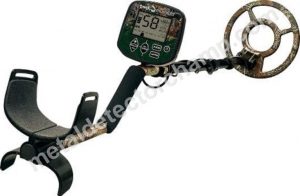
This detector offers a lot of features that beginners will enjoy using. This model comes with an easy to read LCD screen which displays the target object’s depth, discrimination and sensitivity settings as well as battery life – this is especially helpful for those who tend to forget about checking their batteries from time-to-time. It also includes three different modes: all metal mode (no discrimination), motion or pinpoint mode (motion gives you precise readings while pinpoint ensures accuracy) and discriminate mode where you can choose between eight levels of sensitivities depending on what area you’re hunting in.
It has a lightweight construction at just two pounds so it won’t weigh down your arm if used for extended periods throughout the day The waterproof search coil trips up soil and mud and can be submerged in up to two feet of water. The Bounty Hunter Titanium is a sturdy model that has been made with the needs of beginners in mind – we highly recommend it as one of the best metal detectors for entry-level users.
This machine comes at an affordable price, but offers more features than most other models on this list (including higher end machines). It’s easy enough for even young children to use yet powerful enough that adults will appreciate its value too. It includes three modes: all metals mode, motion pinpoint and discrimination which provides eight levels of sensitivity depending on what area you’re hunting in.
- Lightweight design
- Easy to use LCD screen displays depth, discrimination and sensitivity settings as well as battery life
- Can be submerged up to two feet in water
- Only provides basic features for more advanced users.
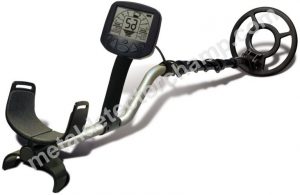
This metal detector is a good choice for beginners because of its ease-of-use. This machine has five different modes: all metals, jewelry and gold, prospecting/coin shooting mode (pulls out items such as coins and small artifacts), tone ID (identifies specific items based on the types of tones it emits) or silent search which helps eliminate any unwanted noise produced by other detectors so you can focus on your hunt without distraction. It also comes with two discs – one round DD high performance coil that’s waterproof up to six feet deep along with an elliptical concentric low frequency coil that provides greater depth penetration in trashy areas.
This unit weighs just over four pounds, making it lightweight enough to be used for hours at a time, as well as being ergonomically designed to reduce fatigue.
The Bounty Hunter Platinum is a complete package that’s perfect for beginners and seasoned hunters alike at an affordable price of under $200 dollars. Although it doesn’t have all the bells and whistles other detectors offer, this unit will help anyone easily locate simple gold nuggets or coins up to several inches deep in dry sand without any problems making it one of the best metal detector for beginners on the market today.
- Lightweight at just over four pounds.
- Affordable price for all beginners on a budget making it the best metal detector under 200 dollars.
- None.
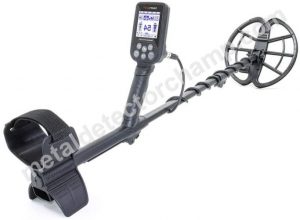
This metal detector is another top choice for beginning hunters. This unit has eight search modes that can be switched between depending on the type of items you want to locate (gold, silver, jewelry or coins) and operates at a frequency range of 13-21 kHz which makes it very sensitive to finding objects in dry sand/soil up to about 12 inches deep.
It comes with three different coils – one standard coil for general use; one smaller coil designed specifically for coin shooting; and an ample size concentric coil great for relic hunting/narrowing down potential targets quickly when out detecting. It weighs just over two pounds making it easy enough even kids could operate this detector without any problems whatsoever.
The Nokta Makro Simplex+ is a great option for someone looking to buy their first metal detector.
- Eight search modes
- Very sensitive to finding objects in dry sand/soil up to about 12 inches deep
- Lightweight – just over two pounds
- Doesn’t come with headphones.
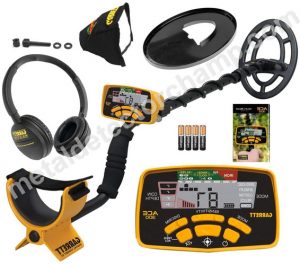
The Garrett ACE 300 Metal Detector has been designed for use by beginners, making it an excellent option when you’re just starting out. It comes with a number of features that help to simplify the process and make it easier than ever before to get started in your search for treasure. The unit is lightweight which makes it easy to carry with you, and the waterproof design means that it can be used in a variety of circumstances.
The ACE 300 is good for beginners because it has both visual and audio indicators when finding metal items. This makes it easy to know what’s going on right away so that you don’t have to keep digging up junk just because your detector said there was something below ground! The rechargeable battery also helps save money while making things easier overall since everything is combined into one unit rather than requiring separate batteries or having them added separately which could lead to misplacing some pieces.
This product would best suit someone who doesn’t want anything too fancy yet still wants some helpful features like more advanced models might offer but at an easy to manage price.
- Lightweight and easy to carry.
- Waterproof for use in a variety of circumstances.
- Visual and audio indicators make it easier to know what’s going on right away without having to keep digging up junk!
- Not as many features as more advanced models might offer, but still helpful ones present at an affordable price point.
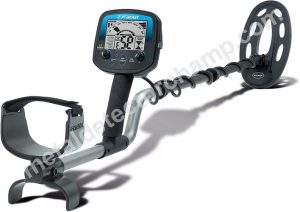
The Teknetics Omega is one of the best metal detectors for beginners. It has an intuitive target identification system so you can accurately determine what you are looking at, whether it’s trash or treasure. You will be able to identify targets quickly and easily with this detector, letting you take your time in digging up potential valuables instead of just blowing them off as nothing more than junk! The great thing about entry-level devices like this is that they come with a simple push button operation that makes learning how to use it quick and easy even if you have never used any other type of machine before.
This device also has a lightweight ergonomic design which lets people on all sorts of budgets enjoy using their own personal metal detector without having to worry about hand cramps or discomfort. The enjoyment of using your own metal detector is also increased by the fact that it has a longer battery life than many other entry-level machines on the market which makes this device ideal for beginners who want value without having to pay out too much money!
- Lightweight
- Longer battery life than many other entry-level devices on the market.
- Not waterproof
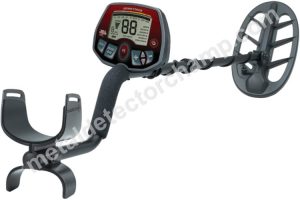
The Bounty Hunter Land Ranger Pro is a great metal detector for beginners. This device has several features that make it easy to use right out of the box, including a three-tone audio system and an item identification icon which lets you quickly see whether or not you have found something valuable without having to dig up every single piece of junk! It also comes with tone ID technology so no matter what type of metal you are looking at, from gold alloys to silver coins, this machine will be able detect it accurately. The higher quality headphones allow people using them to pick up low tones thanks to their superior sound quality compared many other entry-level devices on the market today.
A lot of research goes into making sure that whatever product we recommend as the best metal detector for beginners is accessible, easy to use and affordable. We also make sure that all of our reviews are written by real customers so you can be confident in your purchase!
- Three- tone audio system
- Item identification icon
- Tone ID technology for all types of metals
- Heavy and bulky to carry around
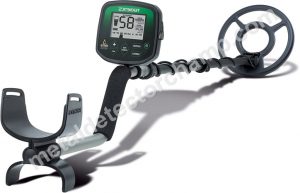
Another great metal detector for beginners is the Teknetics Delta 4000. This device has a sturdy, ergonomic design and an easy to read LCD screen which shows you all of your parameters as well as how much battery life remains. Additionally, because this machine features four-frequency technology it can detect both UHF and VLF frequencies from 0.35 kHz up to 100 kHz! The unit operates on three AA batteries that are included in purchase price so no need to go out before heading over to the beach or park where you plan on hunting.
The weight of 13 ounces makes it about average compared with other entry level devices while also being durable enough not fall apart after repeated use thanks to its ABS plastic casing construction . It even comes with a two-year warranty which is great for those just starting out and not sure how often they will be going on trips to search for treasure.
- Able to detect both UHF and VLF frequencies
- Average weight of 13 ounces
- Not as high a number of reviews as other detectors on the list.
How To Choose The Best Metal Detector for Beginners
The best beginner metal detector operates at a frequency of the U.S. coin standard – 14 kHz +/- depending on your preferences and needs.
This is one factor to consider when shopping for a new entry-level model, as it will determine what types of objects you can find or miss out on! For example, if you buy an entry level unit with a lower operating frequency (below 13 kHz), then finding small gold rings may be difficult because they fall within its range. Detecting silver coins would not pose much difficulty though since their conductivity falls between that of iron and nickel, which both have frequencies above 13kHz .
For beginners, discrimination is a feature that you will probably ignore. This function helps to block out junk metal from your signal – it’s most useful when detecting large areas of ground or water where the detector may become overwhelmed by trash signals.
In general though, entry level detectors offer at least some degree of discrimination and can be adjusted for iron content . The more features a beginner machine has, the better they’ll typically perform in this regard! For instance there are models designed specifically for gold prospecting which would include enhanced discrimination abilities as well as specialized audio tones to help distinguish between targets such as small nuggets versus larger pieces of jewelry . If you’re serious about finding treasure then these additional options might just pay off!
Stands for Visual Discrimination Indicator. This is a feature specific to Garrett detectors which helps you distinguish between targets in your search-zone that are most likely junk, and the ones worth digging up.
This function has it’s pros and cons – while some people enjoy this added level of control others prefer using their own discrimination abilities with each target they find! The VDI doesn’t discriminate any better than you can so ultimately you may still miss out on some gold nuggets if say there was an iron ring near by . However it does offer something no other metal detector can: visual feedback!
The size and shape of a search coil directly correlates to the ground coverage, depth capabilities, and sensitivity of a metal detector.
It’s important that beginners don’t choose a machine with too large or small coils as it will limit its performance! If you’re going to be detecting land then an elliptical shaped coil is typically preferred because they offer better balance between pinpointing accuracy and larger target detection . One can use this type on mineralized soil if properly calibrated but for most beginner purposes an elliptical-shaped coil would suffice.
Detecting with a metal detector is different than using an audio one. If you’ve used any type of instrument before such as a guitar or piano, then this will be easy to pick up! The idea here is that we must pinpoint our targets and follow the signal of interest to its location in order to get more accurate readings for identification purposes .
Another feature unique about metal detectors, at least when compared with other instruments, is their ability to discriminate between ferrous (iron) and non-ferrous metals. Ferrous objects might include cast iron toys or rusty nails while gold rings would fall into the latter category.
The audio signal of a metal detector will either be represented by tones or numbers.
Tones are typically preferred because they’re easier to distinguish from one another and provide additional information about the type of target you’re after . The number system can also help when it comes to identifying silver coins but for beginners, traditional audio tones should suffice. An example would be an increasing pitch indicating a higher likelihood that your target is gold in nature!
If you’re planning to do any type of beach hunting then this is an essential function! The ground balance setting allows the metal detector to ignore mineralization in the soil, which would otherwise cause false readings or inaccurate detection. This ensures that your machine will pick up on small gold nuggets instead of iron bits and other junk objects .
For beginners we would recommend purchasing a model with factory presets for both saltwater and non-saltwater applications as it saves time spent adjusting settings later – just select line #21 when using Garrett detectors. You can always customize these parameters if desired but most won’t need to at first because they work well out of the box!
Beach hunting is a lot of fun but the saltwater will wreak havoc on your equipment if you let it!
If you’re going to do any type of beach detecting then make sure that your metal detector has a good water resistance rating. Most high-end models have this included, especially from manufacturers such as Garrett and Fisher which are typically more expensive . Some detectors sold for beginners may not have been designed with these features so before purchasing be sure that its intended purpose can handle being submerged in saltwater without causing damage or malfunctions!
If you plan to do any type of hunting, such as hiking or searching in the woods, then this is a good thing to look at!
The size and weight of your metal detector will depend on its intended purpose. If it’s for use by children then we wouldn’t recommend anything too heavy but if it’s for adults who want something lightweight and portable that can be easily carried then this shouldn’t be an issue . Beginners typically prefer lighter models because they’re easier to carry around without tiring out their arm muscles – especially important for parents looking after multiple kids!
Metal Detecting Tips for a Beginner
- If you can, try to detect on the beach with a partner. It’s great fun and it helps cover more ground!
- If planning to do any type of hunting then make sure that your metal detector has good water resistance or else risk damaging your machine .
- For beginners who are children , consider purchasing an instrument designed for smaller hands which would be easier to grip . These models also tend to have simpler buttons so there is less chance of them breaking. A heavier model might not be ideal because kids will get tired quickly after carrying something around all day !
- Before investing in a high end model check out some video reviews online first – these should give a better idea about what features work well and which ones don’t live up to expectations . So don’t just go with a model based on price or brand name alone!
- If you’re serious about metal detecting then there is no reason why it can’t be used as an educational tool to teach children about the history of our civilization and how we have evolved over time. It’s also fun so kids will enjoy learning this way too , rather than from boring textbooks at school!
- Don’t forget to take breaks every once in awhile because doing something for long periods of time without resting can lead to injury if not careful ! Make sure that your muscles are relaxed before digging anything up, especially after spending hours crouching down or holding any type of weight above one’s head – even small gold nuggets aren’t worth causing serious damage to your back or legs!
- If you plan on burying any type of metal object then make sure that it will be at least a few inches deep and not too close to the surface . This is because some detectors can detect objects as small as a penny if within range but don’t always give great depth readings which means that they could end up buried way below where you thought. Some models also have ground balancing features designed for hunting in mineralized soil, like beaches , so look out for these types of functions before purchasing one !
Frequently Asked Questions
Conclusion
If you’ve been looking for a metal detector to get started with, it can be difficult to find the best one. We know that finding the right beginner-friendly device can take some time and research, but we want to help! In this blog post, we cover everything from what features are necessary in a new metal detector for beginners all the way through our top picks of detectors for your first foray into amateur treasure hunting. Whether you’re just starting out or if you need an upgrade like most people do after they realize how much fun (and lucrative) it is, there’s something here for everyone!